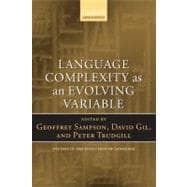
Note: Supplemental materials are not guaranteed with Rental or Used book purchases.
Purchase Benefits
What is included with this book?
| A Linguistic Axiom Challenged | |
| How Much grammar Does it Take to Sail a Boat? | |
| On the Evolution of Complexity - Sometimes Less is More in East and Mainland Southeast Asia | |
| Testing the Assumption of Complexity Invariance: The Case of Elfdalian and Swedish | |
| Between Simplification and Complexification: Non-standard Varieties of English Around the World | |
| Implicational Hierarchies and Grammatical Complexity | |
| Sociolinguistic Typology and Complexification | |
| Linguistic Complexity: A Comprehensive Definition and Survey | |
| Complexity in Core Argument Marking and Population Size | |
| Oh noo!: A Bewilderingly Multifunctional Saramaccan Word Teaches us How a Creole Language Develops Complexity | |
| Orality Versus Literacy as a Dimension of Complexity | |
| Individual Differences in Processing complex Grammatical Structures | |
| Origin and Maintenance of Clausal Embedding Complexity | |
| Layering of Grammar: Vestiges of Protosyntax in Present-day Languages | |
| An Interview With Dan Everett | |
| Universals in Language or Cognition? Evidence from English Languae Acquisition and from Piraha | |
| "Overall Complexity" - a Wild Goose Chase? | |
| An Efficiency Theory of Complexity and Related Phenomena | |
| Envoi | |
| The Editors | |
| References | |
| Index | |
| Table of Contents provided by Publisher. All Rights Reserved. |
The New copy of this book will include any supplemental materials advertised. Please check the title of the book to determine if it should include any access cards, study guides, lab manuals, CDs, etc.
The Used, Rental and eBook copies of this book are not guaranteed to include any supplemental materials. Typically, only the book itself is included. This is true even if the title states it includes any access cards, study guides, lab manuals, CDs, etc.